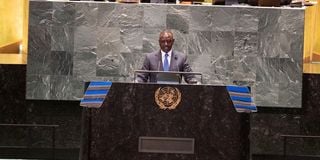Kenya joins global coalition to end plastic pollution

President William Ruto delivers the National Address at the UNGA Summit of the Future, on September 22, 2024.
What you need to know:
- The world hopes to end plastic pollution by 2050.
Plastics, like many inanimate things, are immortal. Once they make it out of the factory, they live forever. They are always with us –in our food, clothes, hospitals, at work, you name it.
In their lifetime, they spend a few years being of good use to humans. After fulfilling their purpose, they are dumped and now retaliate by becoming a menace to the very people that once found them useful. They affect people’s health, their environment, choke marine wildlife, impede food and water safety and, to some extent, they also contribute to climate change.
This is why the world hopes to end plastic pollution by 2050. The audacious goal now fronted by the High Ambition Coalition to End Plastic Pollution was first hashed over in 2022 when over 175 countries agreed for the need of a resolution to end plastic pollution by creating a plastic treaty. The culmination of the treaty is set to happen this year.
Global leaders have only a few months to walk the talk as they prepare to meet later this year in Busan, South Korea, for the fifth session of the Intergovernmental Negotiating Committee to finalise the creation of an international legally binding instrument on plastic pollution.
In the recent United Nations General Assembly, Kenya joined 66 other countries that have signed the High Ambition Coalition with the aim of ensuring the world is free from plastic pollution.
“Kenya remains firm in the commitment to environmental sustainability. We understand that preventing plastic pollution is important not only for our ecosystem, but for the current and future generations,” said President William Ruto when hosting a side event at UNGA on Galvanizing Momentum for the Global Plastic Pollution Instrument.
“Plastic waste causes severe threats to both the environment and to our economies. While plastic pollution creates jobs and supports various industries, the cost far outweighs the benefits,” he added.
Those who have signed the High Ambition Coalition are hoping for a comprehensive and circular approach that ensures urgent action and effective interventions along the full lifecycle of plastics including design, production, consumption and end of life.
“We emphasise that effective and common legally-binding global rules are essential to address the negative economic, social, cultural and environmental impacts of plastic pollution in all countries, in particular in developing countries and especially in Least Developed Countries and Small Island Developing States,” read a recent letter signed by members who have signed the coalition.
“Polluters should be held responsible for their activities and products, recognising that economic tools appropriate to national circumstances are part of the solution, including extended producer responsibility schemes and an end to harmful incentives such as subsidies that work against efforts to end plastic pollution.”
The coalition also calls for a principle where polluters must be responsible for their activities and products, recognising that economic tools appropriate to national circumstances are part of the solution, including extended producer responsibility schemes and an end to harmful incentives such as subsidies that work against efforts to end plastic pollution.
Civil societies championing the reduction of plastic pollution like Greenpeace commend Kenya for joining the High Ambition Coalition, but remind them to also endorse and sign the Bridge to Busan Declaration.
“Kenya should champion a treaty that prioritises reducing plastic production by at least 75 per cent by 2040, based on the 2019 baseline, in order to maintain global temperatures below 1.5° C and safeguard our health, rights, communities, and the planet,” said Gerance Mutwol, Plastics Campaign manager at Greenpeace.
In 2017, Kenya made a bold move to ban the use of plastic bags, which came with a lot of criticism especially from manufacturers who said about 60,000 people were going to lose their jobs.
The latest analysis (2021) from the National Environment Management Authority shows that the compliance level of single-use plastic ban is at 95 per cent.
A 2019 study conducted by Jane Mutheu of the Institute for Peace and Environmental Studies, University of Nairobi, shows that food vendors, petty retailers and wholesalers are enablers of the single-use plastic. The study was conducted in Kibra, the country’s largest slums located in Nairobi.
Kenya is still trying to be better in terms of reducing the plastic menace. In 2022, the Sustainable Waste Management Act was signed into law, embracing the shift from a linear economy to a circular economy.
The United Nations vouches for a circular economy, explaining that it is one whose products and materials are designed in such a way that they can be reused, remanufactured, recycled or recovered.
Kenya, however, still struggles with waste segregation at source as people still mix all their waste in one bin instead of separating as is required in the National Waste Management Strategy.





